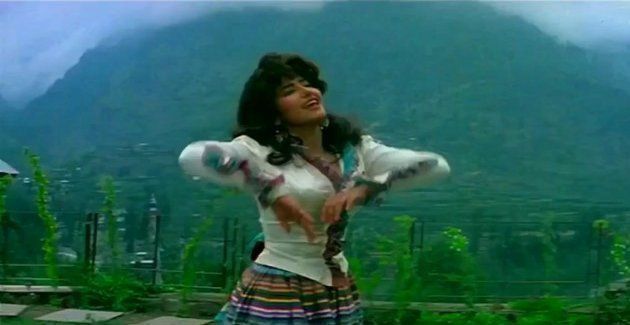1942: A Love Story (1994) 

Director: Vidhu Vinod Chopra
Cast: Anil Kapoor, Jackie Shroff, Manisha Koirala
Synopsis: A young Indian couple, both from wealthy backgrounds, find themselves caught up in the 1940’s Indian revolutionary movement against their families whom are under the thumb a sadistic British general.
1942: A Love Story, in common with most of India’s movie output is something of a curiosity. It has the scope and scale of a western ‘event’ movie, yet seems to have no ambitions to widen its audience beyond the borders of its own nation and people, which is a shame. There is much to commend this movie, and it deserves a wider audience, but its long running time — thanks to the obligatory insertion of a dozen songs — effectively precludes it from finding an international audience and the wider recognition it deserves.
The story is nothing more than a spin on Shakespeare’s ‘Romeo and Juliet’, set in India in 1942 against the backdrop of the Indian nation’s struggle for independence from British rule. Naren Singh (Anil Kapoor) and Rajeshwari (Manisha Koirala) are our star-crossed lovers: he’s the son of a high-ranking Indian official who has sold himself to the British in return for an opulent lifestyle, while she is the daughter of a resistance leader plotting the assassination of a visiting general. At the outset of the movie, Naren is something of a worthless gadabout, dressing like an Englishman — although no self-respecting Englishman would be seen dead in the foppish caps he wears — and leading a generally aimless existence, until he meets, and falls in love with, the beautiful Rajeshwari.
From the opening titles, in which we see a close-up of the Union flag as the ‘Mars’ sequence from Gustav Holst’s Planets Suite plays, it is obvious that director Vidhu Vinod Chopra has grand plans and intends to tell a story on an epic scale. It’s disappointing, therefore, that, after a promising start, he feels it necessary to develop the lover’s romantic relationship via a series of soppy song-and-dance numbers that seem to turn up with excruciating regularity. Apparently, Hindi audiences insist on these musical interludes in their films, and so they are possibly included for commercial reasons but, as they are almost wholly superfluous to the plot and do nothing but bring the film to a grinding halt, they are possibly cinema’s best argument for judicious editing for an overseas market. The running time of this movie would probably come down to a manageable 105 minutes instead of the bloated 145 minute version that currently exists. The very idea probably amounts to sacrilege in the eyes of the home audience and I’m not in favour of censorship but skilful editing (together with directorial talent — which Chopra has in abundance) is the core of good movie-making. If nothing else, these musical numbers sit uneasily with the main thrust of the storyline, and nobody in the western world will feel comfortable rooting for a leading man who keeps prancing around like a camp dancer at the drop of a foppish hat.
Thankfully, once Chopra has finally established the strength of the relationship between Naren and Rajeshwari, the story largely eschews musical asides in order to concentrate on the rebels struggle to assassinate the visiting general and things improve considerably. Plot twists come thick and fast, and help build up expectations as we approach a climax that, while both overlong and somewhat overwrought, doesn’t disappointment.
Overall, this movie is worth watching despite its bum-numbing length: Chopra shows a sure hand when directing large crowd scenes; he captures some beautiful images on the screen, handles the sprawling plot with assurance, and even manages to transform that camp foppish dancer into a hero worth rooting for by the film’s finale. Only the movies’ depiction of the British, symbolised by the ridiculously over-the-top sadistic General ” ‘ang ‘im” Douglas (Brian Glover – An American Werewolf in London, Snow White: A Tale of Terror – of all people!) who seems intent on lynching or shooting any Indian unlucky enough to come within ten yards of him, leaves a sour taste. No doubt we Brits were harsh rulers, but the point could have been made more forcefully by refraining from turning the one British character into a laughable caricature of a sadistic military bully. Glover seems to realise this, and plays his part with relish, deliberately, one suspects, going overboard in his depiction, while reining in his performance enough to avoid spoiling the film’s final sequence.
(Reviewed 23rd September 2005)
httpv://www.youtube.com/watch?v=H9sHR4ZrhKc
